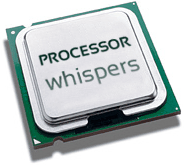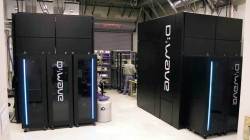Processor Whispers: Of summer, quanta and bubbles
 by Andreas Stiller
by Andreas Stiller
Lots of progress in the field of quantum computers: appropriately enough, some years from now, they are expected to be able to crack conventional encryption in no time at all. On the other hand, though, quantum communication is supposed to offer protection from any kind of unnoticed snooping.
While the massive snooping by NSA, GCHQ, DGSE, KGB, BND and similar three or four letter institutions continues to be this summer's dominant topic, another Nessie sighting in Scotland brings a welcome diversion. Who knows, maybe the many Nessie sightings have been induced by accordingly disguised submarines of various intelligence services tapping into data cables or Sean Connery in his camouflage suit – he was three years old when all this started 80 years ago. The geologists have now come up with another, rather mundane explanation for the phenomenon: seismic bubbles ...
In any case, in the area of conventional processors, there is little going on this summer – apart maybe from Intel's chief technologist, Justin Rattner, heading into his well-deserved retirement. Hence, a variety of research groups, the mentioned geologists being one of them, have taken advantage of the summer slump to release spectacular announcements, most notably the quantum physicists.
Spins ...
In Nature magazine, professor Mario Ruben of the Karlsruhe Institute of Technology (KIT) has reported on impressive results in the area of spintronics with magnetic molecule complexes. The scientists from Karlsruhe, Germany, enclosed the metal atom terbium with around 100 carbon, nitrogen and water atoms, applied voltage via electric gold contacts and were then able to control the spin of the terbium atom through magnetic fields. This "spin transistor" was able to maintain its state for up to 20 seconds, which is an eternity in the realm of quantum mechanical processes.
The previous issue of Nature had been about quantum computers. Lin Li and Alex Kuzmich of the Georgia Institute of Technology reported on their success with the entanglement between light and matter, which is a precondition for an efficient quantum network to exchange information between matter and light.
Nature's competitor, Science magazine, published a summer highlight from the field of quantum optics, namely an all-optical transistor. Researchers at the Massachusetts Institute of Technology (MIT) have managed to control a light beam of up to 100 photons inside a precisely calibrated optical resonator through a single gate photon, just what the logic gate permits to do with the electric current on the source to drain path of a conventional transistor. Although the physics behind the optical transistor is quantum mechanical, the hope is to realise "conventional" gates this way – instead of employing complex entangled states and qubits – but much faster and more energy efficient ones than with the semi-conductors we have today.
... and qubits
As for qubits, there has been considerable progress in very different directions. In June, for instance, professor Jian-Wei Pan of the University of Science and Technology in China (USTC) – also professor at the Heidelberg University in Germany – announced correct calculations with four entangled photons in a system of beam splitters, prisms and mirrors. In collaboration with scientists from Toronto and Singapore, this allowed him to solve the linear equation 3x + y = 2 and x + 3y = 0. Well, mental arithmetic would also do in this case and would even produce exact results – quantum computers usually just return a high probability.
Another quantum leap was achieved by Australian researchers of the University of New South Wales in collaboration with the American Sandia National Lab. They experimented with phosphor atoms in silicon chips and can now influence their spins at will.

![]() D-Wave takes off [--] soon with 2048 qubits.
D-Wave takes off [--] soon with 2048 qubits.
Source: Amherst College
The Canadian company D-Wave still seems to have the most advanced technology in the area of qubits though, and it is also the only one to commercially market such a technology. Their current model, the D-Wave Two, has 512 qubits and the next version, scheduled for 2014, is supposed to feature 2048 qubits. Google, NASA and USRA (Universities Space Research Association) are among the company's clients, all three of which form part of the Quantum Computing Research Collaboration. NASA got involved with D-Wave very early on and took part in the chip manufacturing. Google has been working on quantum algorithms for several years, in particular in the context of image recognition. And researchers at Harvard University were able to successfully test software for protein folding, among many other things.
Arms manufacturer Lockheed Martin was the first company to acquire a D-Wave computer with 128 qubits two years ago, which has since been upgraded to 512 qubits. The scientific director strongly supported the controversial firm D-Wave by declaring that it was indeed a quantum mechanical system, optimised for optimisation problems. Lockheed researchers have developed software for it that would not work with conventional Turing-like machines – an algorithm for proving the correctness of software.
It goes without saying that the American intelligence services and their data providers are interested in D-Wave. So it is no surprise that In-Q-Tel, the high-tech venture capital firm of the CIA, and Amazon founder Jeff Bezos count among the investors.
There is still no information available about the performance of D-Wave's quantum computers, but thanks to the announced achievements and the support of Lockheed, NASA, Google and others, D-Wave's reputation has greatly improved lately. The renowned magazine IEEE Spectrum has even elevated D-Wave to fourth place in the area of computer systems as a result of the magazine's latest patent evaluation – only the industry's giants IBM, HP and Fujitsu are ranked higher.
On the occasion of so much good news, even an ex-champion of the industry has decided to come forward after a long break: Microsoft founder Bill Gates. At the Microsoft Research Faculty Summit 2013 in mid-July, he will be giving the keynote on the topic of "The role of computing in solving global problems" – and presumably he will also talk about quantum computers in this context. So, can the super-fast cracking of encryption be counted among the world's problems waiting to be solved?
(djwm)




![Kernel Log: Coming in 3.10 (Part 3) [--] Infrastructure](/imgs/43/1/0/4/2/6/7/2/comingin310_4_kicker-4977194bfb0de0d7.png)

![Kernel Log: Coming in 3.10 (Part 3) [--] Infrastructure](/imgs/43/1/0/4/2/3/2/3/comingin310_3_kicker-151cd7b9e9660f05.png)












